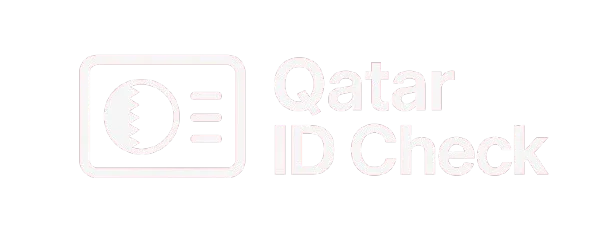Qatar ID for Freelancers – 2026 Legal Work Guide
Freelancers in Qatar can obtain a Qatar ID by registering under a licensed sponsor, setting up a company in a free zone, or applying for special residence permits available for entrepreneurs or skilled professionals. While there is no official “freelance visa,” legal routes exist for independent workers to get residency and a Qatar ID.
Getting a Qatar ID for freelancers in 2026 is possible through legal and structured pathways, even though the country does not issue a direct “freelance visa.” Whether you are already working in Qatar or planning to move, you must hold a valid residence permit (RP) to get your Qatar ID. The process ensures that all residents, employees, investors, and self-employed professionals are officially registered with the Ministry of Interior (MOI).
Your Qatar ID serves as your legal identity in the country, allowing you to access public services, open a bank account, rent property, and travel within GCC countries. You can learn more about how to verify your existing card through the official Qatar ID check service, which is the main hub for checking ID validity and status.
What Is a Qatar ID for Freelancers?
A Qatar ID for freelancers is a national identification card issued after you secure legal residency under a sponsor, free zone company, or business entity.
This card includes your name, photo, QID number, and profession. Freelancers who register properly under an authorized structure can legally live and work in Qatar, receive payments, and access services like healthcare or vehicle registration.
Can Freelancers Work Legally in Qatar?
Yes, freelancers can work in Qatar legally if they are registered under a valid residency and sponsor.
Although Qatar does not currently issue a “freelance visa,” there are three main pathways through which freelancers can operate legally and obtain a Qatar ID.
1. Sponsorship Through a Local Company
Freelancers can collaborate with a licensed Qatari company that provides sponsorship and work authorization.
Before you start, understand: this option involves working under the sponsor’s umbrella, paying annual fees, and adhering to Qatar’s labor regulations.
Steps:
- Find a company that offers sponsorship for freelance or consultancy services.
- Obtain a signed employment or service contract.
- The company applies for your residence permit and work visa.
- Complete medical tests and fingerprint registration.
- Once the RP is issued, your Qatar ID card is printed and activated.
For detailed insight into residence applications, you can read the How to get Qatar ID guide.
2. Setting Up a Free Zone Company (QFZ or QFC)
Registering a company in Qatar’s Free Zones or Qatar Financial Centre (QFC) is the most reliable option for independent professionals who want to operate without an employer.
Key Benefits:
- You can sponsor yourself for a residence permit.
- 100% foreign ownership allowed.
- Corporate bank account eligibility.
- Permission to hire limited staff under your company.
Basic steps:
- Apply for a trade license in the QFC or QFZ category.
- Receive an establishment ID.
- Apply for your residence permit and Qatar ID.
- Renew the QID annually through your business license.
This path is popular among IT consultants, designers, marketers, and engineers working independently.
3. Entrepreneur and Talent Residence Programs
Qatar’s government has introduced long-term residence permits for investors, entrepreneurs, and skilled professionals contributing to national growth.
Freelancers who meet the eligibility requirements for entrepreneur or talent residency programs can get multi-year residence permits without traditional sponsorship.
Eligibility highlights:
- Demonstrated professional portfolio or business achievements.
- High-demand skills in technology, design, research, or innovation.
- Investment in Qatar-based initiatives or partnerships.
Applicants who qualify can obtain residency directly and later apply for permanent residency. You can explore similar eligibility details in the Qatar Permanent Residency Eligibility guide.
How to Apply for a Qatar ID as a Freelancer
Freelancers must complete the standard MOI process after obtaining legal residency.
Step-by-Step Process:
| Step | Action | Details |
|---|---|---|
| 1 | Apply for Entry Visa | Sponsored by a company or your own business entity |
| 2 | Enter Qatar | Submit the required documents to immigration |
| 3 | Medical & Fingerprint Tests | Conducted at the MOI-approved centers |
| 4 | Residence Permit Issuance | Your sponsor or business finalizes this step |
| 5 | Qatar ID Issued | Collect card from MOI or Q-Post |
If you are new to the country, you can also learn about residence permit rules and validity through this comprehensive Qatar Residence Permit guide.
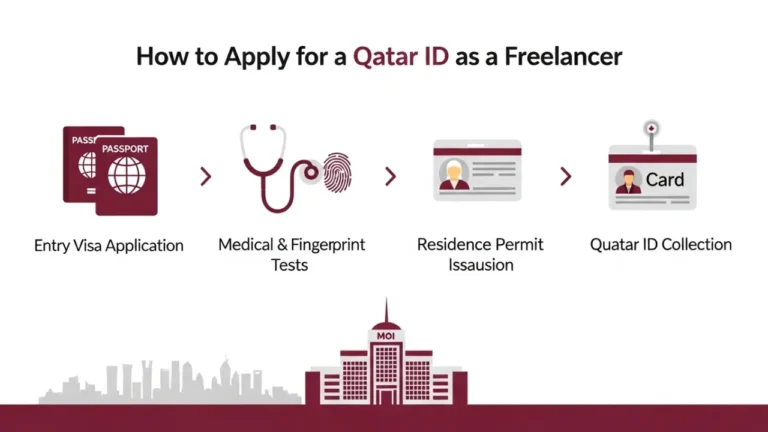
Documents Required for Freelancers Applying for Qatar ID
Before applying, freelancers need to ensure all legal documents are prepared.
Documents checklist:
- Copy of passport (valid for 6+ months)
- Work or business license from your sponsor or company
- Entry visa approval copy
- Medical and fingerprint certificates
- Passport-sized photos
- Fee payment proof
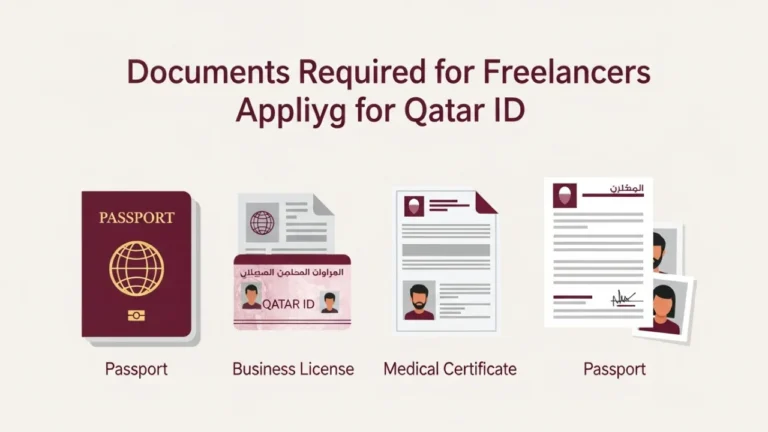
Cost of Getting a Qatar ID for Freelancers
The cost of obtaining a Qatar ID varies depending on your route:
| Route | Estimated Cost (QAR) | Renewal Frequency |
|---|---|---|
| Sponsored by local company | 500 – 1,000 | Yearly |
| Free zone company (QFC/QFZ) | 3,000 – 5,000 | Yearly |
| Entrepreneur/talent residency | 2,000 – 3,000 | Multi-year |
These figures include medical test fees and MOI card issuance charges. Always confirm the latest rates at an MOI Service Center before applying.
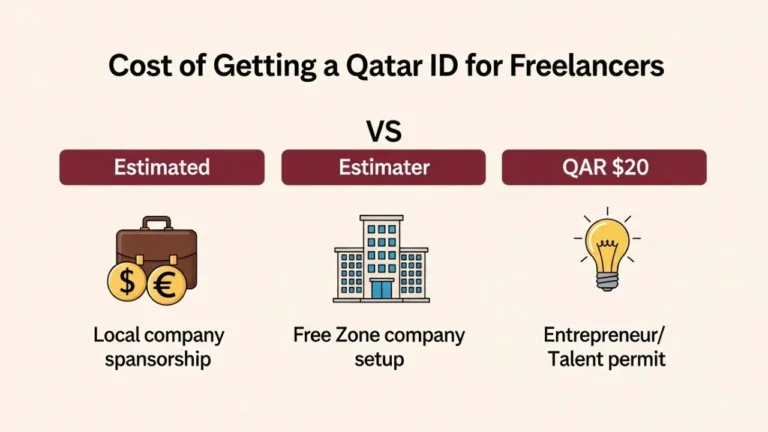
Can Freelancers Sponsor Family Members?
Yes, freelancers who have a valid residence permit, minimum income (around QAR 10,000+), and rented housing can sponsor their family.
You can review the complete family rules in this detailed Family Residence Permit Qatar guide.
Benefits of Having a Qatar ID for Freelancers
Holding a valid Qatar ID gives freelancers the same legal privileges as full-time employees.
Key benefits include:
- Legal recognition and access to all MOI services.
- Ability to open a business or bank account.
- Freedom to sign contracts and receive payments legally.
- Travel flexibility with multiple entry permissions.
- Access to a health card and government e-services.
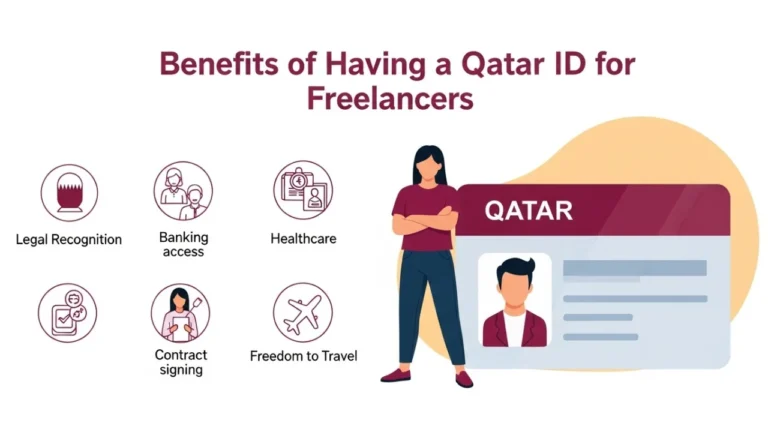
Common Issues Freelancers Face During Application
Freelancers sometimes experience delays or rejections during the ID process due to documentation gaps or mismatched sponsorships.
Frequent problems:
- Incorrect company registration type.
- Missing medical or fingerprint clearance.
- Late renewal of residency leading to expired QID.
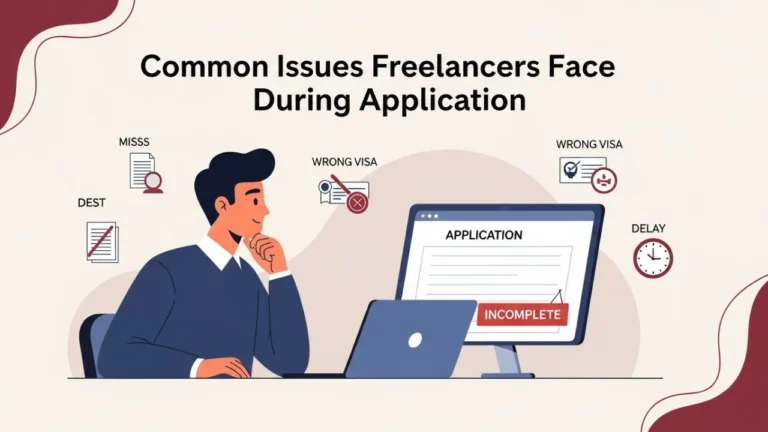
Tips to Get Qatar ID Faster as a Freelancer
To make the process smoother, follow these smart steps:
- Choose a reliable, licensed sponsor or legal zone.
- Ensure your visa type matches your intended work.
- Book your medical and fingerprint appointments early.
- Track your card delivery via the QPost service.
- Renew your permit before expiry to avoid penalties.
FAQs – Qatar ID For Freelancers
Conclusion
Getting a Qatar ID for freelancers in 2026 is entirely possible through the right legal routes. Whether you register under a sponsor, open a free zone company, or qualify for an entrepreneur permit, the Qatar ID ensures your legal status and access to services. For most expats and digital workers, this card is essential to live, work, and operate independently in Qatar.
